Basil Plant Care Organic Methods
Basil is a popular herb that can be easily grown organically. Here are some tips for growing basil without chemicals:
- Choose a sunny spot with well-drained soil.
- Plant basil seedlings 12-18 inches apart.
- Water basil plants regularly, especially during hot weather.
- Fertilize basil plants every few weeks with a balanced organic fertilizer.
- Mulch around basil plants to help retain moisture and suppress weeds.
- Harvest basil leaves as needed by pinching them off the stem.
Organic Basil Plant Care
Growing basil organically is a rewarding experience that allows you to enjoy the aromatic and flavorful herb without the use of synthetic chemicals. By following a few simple steps, you can create a thriving basil plant that will provide you with an abundance of fresh leaves throughout the growing season.
One of the most important aspects of organic basil plant care is providing the right growing conditions. Basil prefers well-drained, fertile soil with a pH between 6.0 and 6.5. It also needs plenty of sunlight, so choose a location that receives at least six hours of direct sunlight per day.
When watering your basil plant, be sure to water deeply and regularly, especially during hot, dry weather. Avoid overwatering, as this can lead to root rot. Fertilize your basil plant every few weeks with a balanced organic fertilizer. I recommend using a fertilizer that is specifically designed for vegetables and herbs.
To control pests and diseases, I use a variety of natural methods. I spray my basil plants with a mixture of water and neem oil, which is a natural pesticide. I also use companion planting to deter pests. For example, I plant basil next to tomatoes, which helps to repel aphids.
By following these simple tips, you can grow healthy, organic basil plants that will provide you with an abundance of fresh leaves all season long.
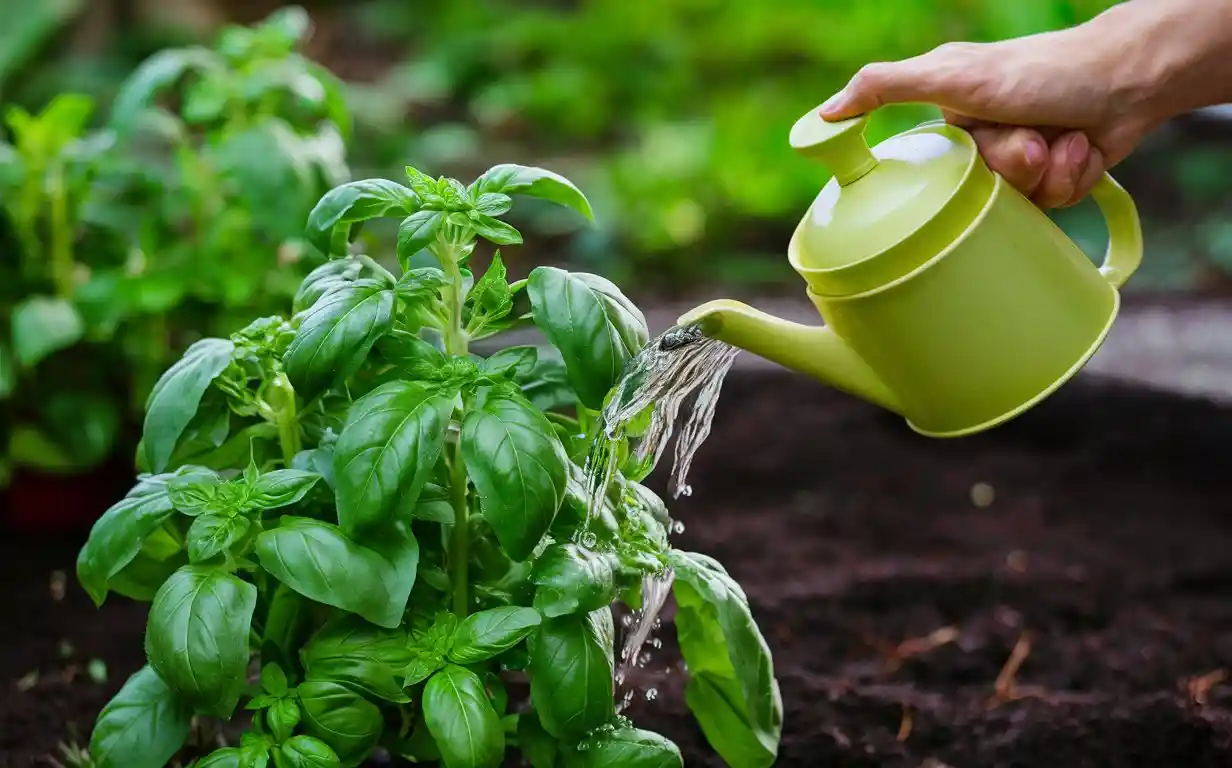
Basil Plant Care Organic
Growing basil organically is a natural and sustainable way to enjoy this flavorful herb in your culinary creations. Here are some key principles to follow for organic basil plant care:
- Choose organic seeds or seedlings: Start with certified organic seeds or seedlings to ensure you’re growing basil free from chemical treatments.
- Provide nutrient-rich soil: Basil thrives in well-drained, fertile soil. Amend your soil with organic matter such as compost or manure to provide essential nutrients.
- Water deeply and regularly: Water your basil plants regularly, especially during hot, dry weather. Avoid overwatering, as this can lead to root rot.
- Fertilize naturally: Use organic fertilizers such as fish emulsion or seaweed extract to provide nutrients for your basil plants. Avoid synthetic fertilizers, as they can harm beneficial soil organisms.
- Control pests and diseases naturally: Prevent pests by maintaining good garden hygiene and using companion planting techniques. Treat diseases with natural remedies such as neem oil or baking soda solutions.
- Mulch around plants: Spread a layer of organic mulch around your basil plants to retain moisture, suppress weeds, and regulate soil temperature.
- Harvest sustainably: Harvest basil leaves regularly to encourage new growth. Avoid removing more than one-third of the plant at a time.
By following these organic basil plant care practices, you can cultivate a healthy and flavorful basil crop without relying on chemical inputs.
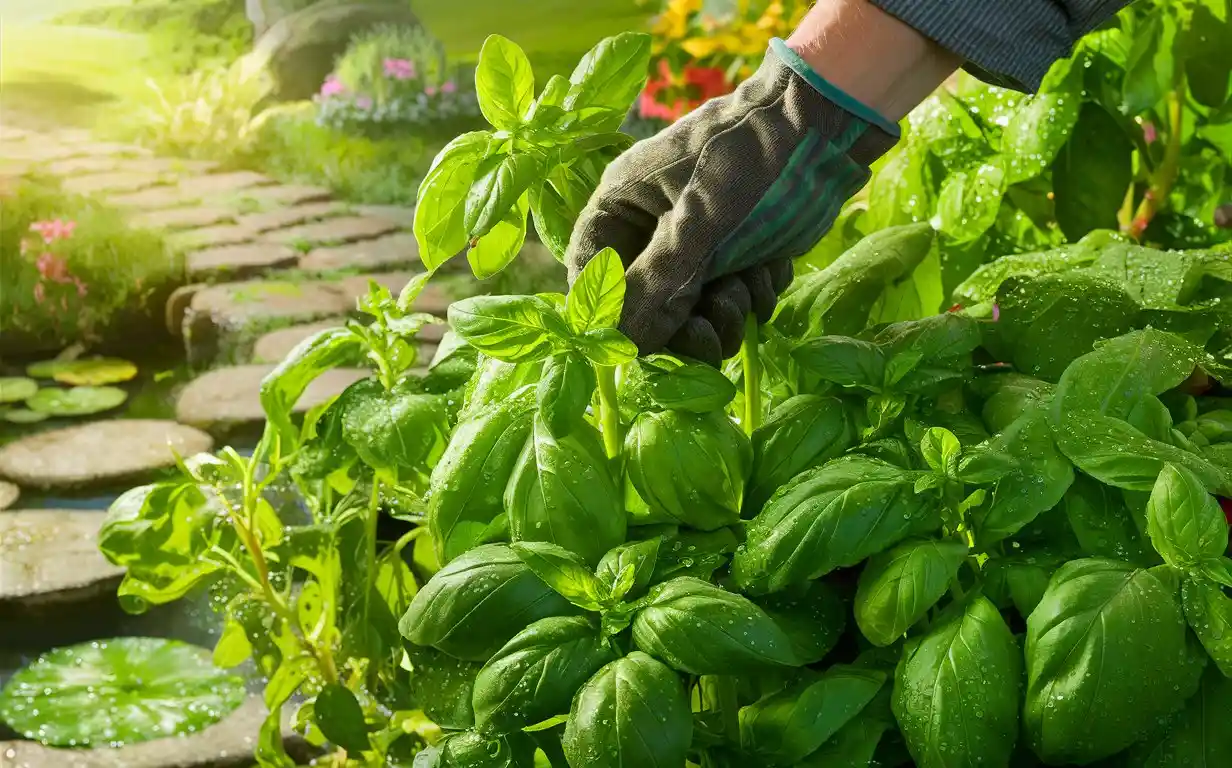
How to Grow Basil Organically
Growing basil organically is a rewarding experience that allows you to enjoy the fresh, aromatic herb without the use of harmful chemicals. Here’s a comprehensive guide to help you cultivate healthy and thriving basil plants organically:
1. Choose the Right Soil: Basil prefers well-drained soil rich in organic matter. Amend your soil with compost or aged manure to improve fertility and drainage.
2. Plant in a Sunny Location: Basil needs at least six hours of sunlight per day. Choose a spot in your garden that receives ample sunlight throughout the growing season.
3. Water Regularly: Water your basil plants deeply and regularly, especially during hot and dry weather. Avoid overwatering, as soggy soil can lead to root rot.
4. Fertilize Naturally: Feed your basil plants with organic fertilizers such as compost tea, fish emulsion, or seaweed extract. Avoid using synthetic fertilizers, as they can harm beneficial soil microorganisms.
5. Control Pests and Diseases Naturally: Prevent pests and diseases by using companion planting techniques. Plant basil near tomatoes, carrots, or marigolds to deter pests. Use natural remedies like neem oil or insecticidal soap to control insects if necessary.
6. Harvest and Store: Harvest basil leaves as needed by pinching or cutting them off the stem. Store fresh basil in a glass of water in the refrigerator for up to a week. You can also dry or freeze basil for longer storage.
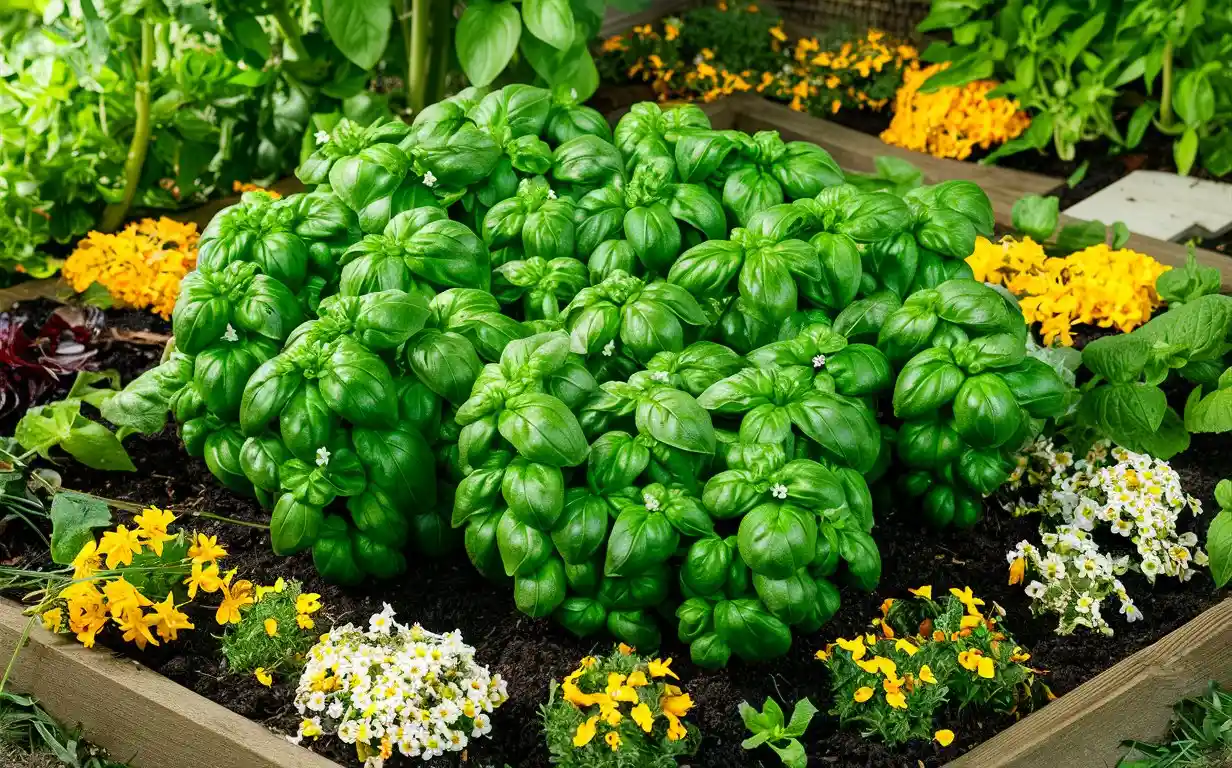
Organic Basil Growing Guide
Here’s a guide to help you healthy basil plants naturally:
1. Soil Preparation: Choose a well-drained soil rich in organic matter. Amend the soil with compost or manure to improve fertility and water retention.
2. Planting: Sow basil seeds directly in the garden after the last frost. Space the seeds 6-8 inches apart and cover them lightly with soil. Water thoroughly.
3. Watering: Water basil plants regularly, especially during hot, dry weather. Avoid overwatering, as soggy soil can lead to root rot.
4. Fertilizing: Fertilize basil plants every few weeks with a balanced organic fertilizer. Avoid using synthetic fertilizers, as they can burn the roots.
5. Mulching: Spread a layer of organic mulch around the basil plants to retain moisture, suppress weeds, and regulate soil temperature.
6. Pest and Disease Control: To prevent pests and diseases, practice good garden hygiene, such as removing infected leaves and rotating crops. Use natural pest control methods, such as neem oil or insecticidal soap.
7. Companion Planting: Plant basil alongside other compatible plants, such as tomatoes, peppers, and carrots. This helps deter pests and improve overall plant health.
8. Harvesting: Harvest basil leaves as needed by pinching them off the stem. Regular harvesting encourages new growth and prevents the plant from flowering.
By following these organic basil growing tips, you can enjoy a bountiful harvest of fresh, flavorful basil without compromising your health or the environment.
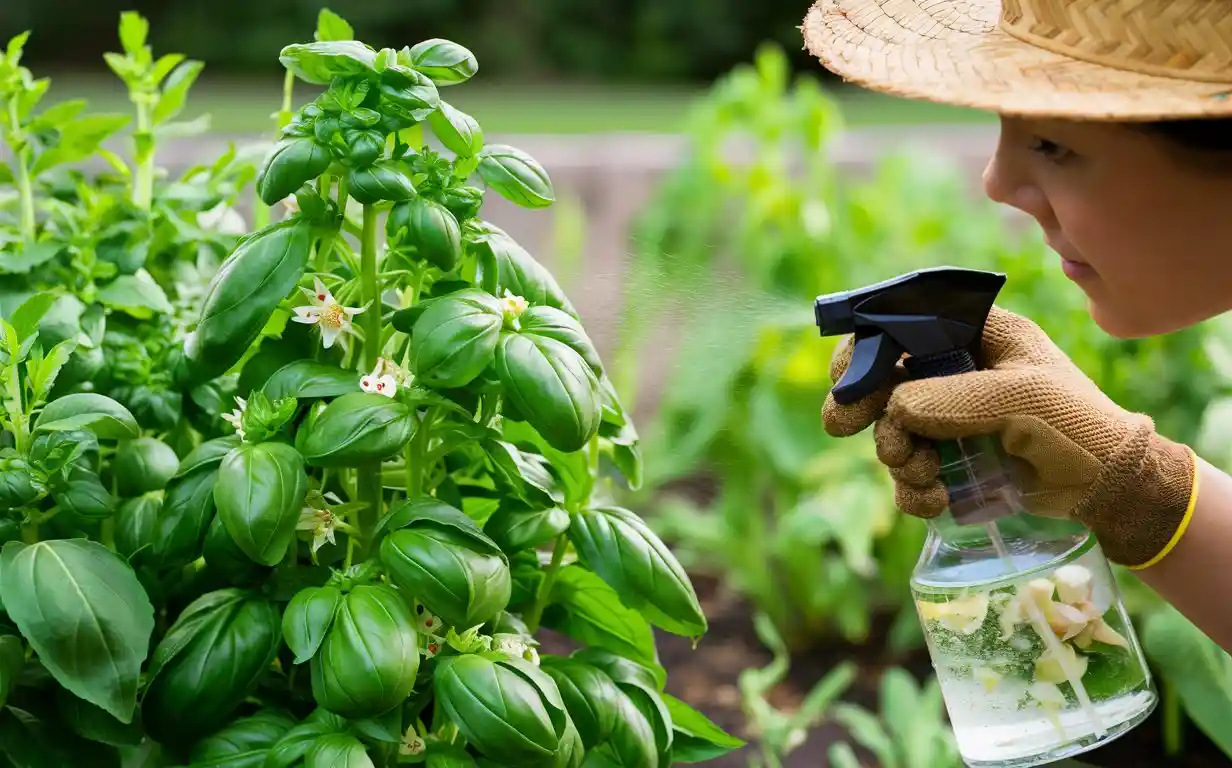
Basil Plant Care Natural
Growing basil organically is a rewarding and sustainable way to enjoy the fresh, flavorful herb. By using natural methods, you can create a healthy environment for your basil plants to thrive without relying on synthetic chemicals or pesticides.
Here are some key principles of organic basil plant care:
- Use organic soil: Organic soil is rich in nutrients and beneficial microorganisms that support plant growth. Look for soil that is certified organic or has been amended with organic matter such as compost or manure.
- Water deeply and regularly: Basil plants need regular watering, especially during hot weather. Water deeply at the base of the plant, allowing the soil to absorb the water thoroughly. Avoid overwatering, as this can lead to root rot.
- Fertilize with organic sources: Organic fertilizers such as compost tea, fish emulsion, or seaweed extract provide essential nutrients for basil plants. Apply fertilizer every few weeks during the growing season.
- Control pests and diseases naturally: Use natural methods to control pests and diseases, such as companion planting, neem oil, or insecticidal soap. Avoid using harsh chemical pesticides, as these can harm beneficial insects and pollute the environment.
- Mulch around the plants: Mulching with organic materials such as straw, hay, or compost helps retain moisture, suppress weeds, and regulate soil temperature. This creates a favorable environment for basil plants to grow.
By following these organic basil plant care practices, you can cultivate healthy, flavorful basil plants that are free from harmful chemicals and pesticides. Enjoy the benefits of homegrown, organic basil in your cooking and gardening.
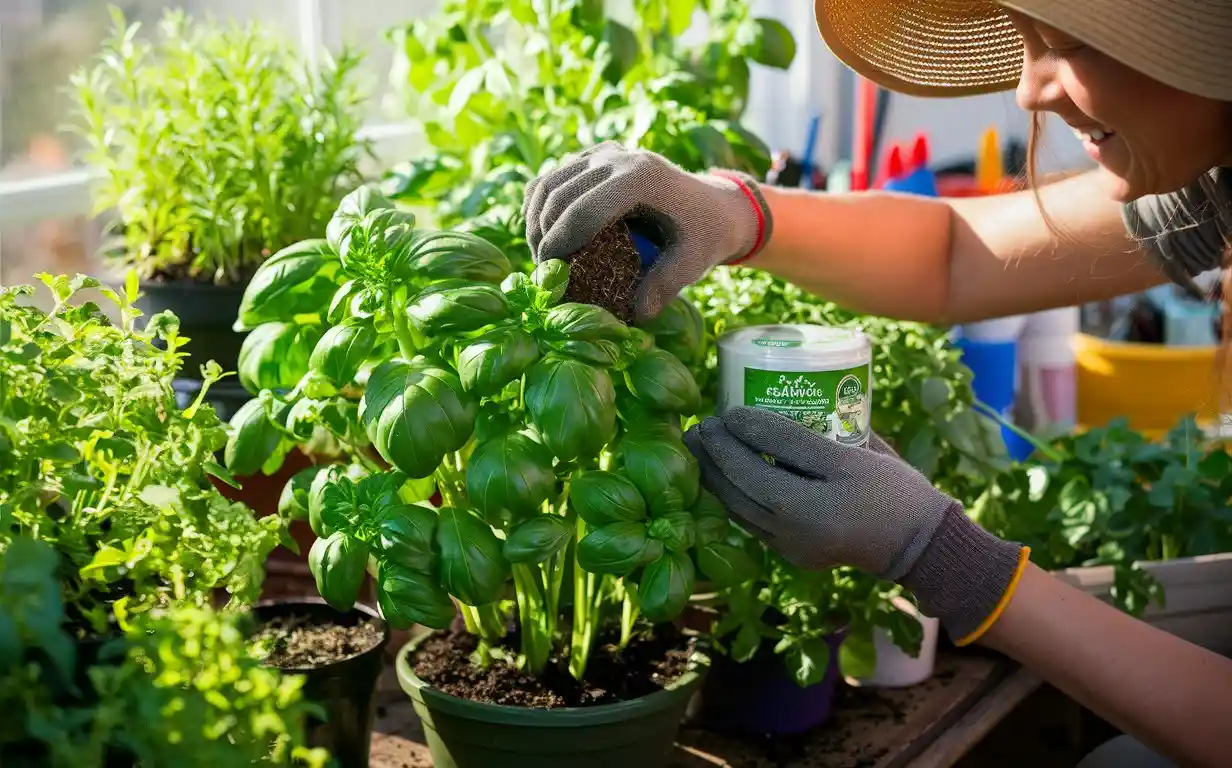
Basil Plant Care Without Chemicals
Growing basil organically without the use of chemicals is essential for maintaining a healthy and sustainable garden. Chemicals, such as pesticides and herbicides, can harm beneficial insects, pollute the environment, and leave harmful residues on your basil plants. Here are some natural methods to care for your basil plants without chemicals:
- Use organic fertilizers: Feed your basil plants with organic fertilizers, such as compost, manure, or fish emulsion, to provide essential nutrients without the use of synthetic chemicals.
- Control pests naturally: Encourage beneficial insects, such as ladybugs and lacewings, to your garden as they prey on common basil pests. You can also use natural pest control methods, such as neem oil or insecticidal soap, to deter pests without harming beneficial insects.
- Prevent diseases: Water your basil plants at the base to avoid getting the leaves wet, as this can promote fungal diseases. Provide good air circulation around your plants to prevent disease buildup.
- Use companion planting: Plant basil alongside other companion plants, such as tomatoes, carrots, or marigolds, to deter pests and improve growth.
- Choose disease-resistant varieties: Select basil varieties that are known for their resistance to common diseases, reducing the need for chemical treatments.
Pesticide-Free Basil Plant Care
To ensure your basil plants thrive without the use of harmful pesticides, embrace natural pest management techniques. Regularly inspect your plants for any signs of pests, such as aphids, spider mites, or whiteflies. If pests are present, consider using insecticidal soap or neem oil, which are organic and safe for use on edible plants. These natural solutions effectively control pests without leaving harmful residues.
Companion planting is another effective strategy for repelling pests. Planting basil alongside tomatoes, carrots, or marigolds can help deter common garden pests. These companion plants release scents that mask the basil’s aroma, making it less attractive to pests. Additionally, encouraging beneficial insects, such as ladybugs and lacewings, into your garden can help control pests naturally.
Maintaining proper sanitation in your garden is crucial for preventing pest infestations. Regularly remove fallen leaves and debris, as they can harbor pests and diseases. Avoid overwatering, as moist conditions can attract fungus gnats and other pests. By following these natural pest management practices, you can cultivate healthy and vibrant basil plants without relying on harmful pesticides.
Sustainable Basil Plant Care
Growing basil sustainably involves practices that minimize environmental impact and promote long-term plant health. Here are some key principles:
- Use organic fertilizers and soil amendments: Avoid synthetic fertilizers and opt for natural alternatives like compost, manure, or seaweed extract. These provide nutrients while improving soil structure and fertility.
- Conserve water: Basil is drought-tolerant, so water it deeply but infrequently. Use mulch around the plants to retain moisture and suppress weeds.
- Companion planting: Plant basil alongside compatible companions like tomatoes, peppers, or carrots. This can deter pests, improve pollination, and optimize space.
- Integrated pest management: Use natural methods to control pests and diseases, such as neem oil, garlic spray, or beneficial insects. Avoid using harsh chemicals that can harm the environment and beneficial organisms.
- Harvest responsibly: Harvest basil leaves regularly to encourage new growth. Avoid over-harvesting, as this can weaken the plant and reduce its lifespan.
By adopting sustainable practices, you can cultivate healthy basil plants while preserving the environment and promoting biodiversity in your garden.
Eco-Friendly Basil Plant Care
Growing basil organically is not only beneficial for your health but also for the environment. By avoiding the use of synthetic fertilizers and pesticides, you can help protect soil health, water quality, and wildlife. Here are some eco-friendly basil plant care practices:
- Use organic compost or manure as a natural fertilizer. These materials provide essential nutrients for your basil plants while improving soil structure and water retention.
- Practice companion planting by growing basil alongside other plants that benefit each other. For example, planting basil near tomatoes can help repel pests, while planting it near carrots can improve carrot growth.
- Encourage beneficial insects by providing a habitat for them in your garden. Beneficial insects, such as ladybugs and lacewings, can help control pests naturally.
- Use organic pest control methods, such as neem oil or insecticidal soap, to manage pests without harming beneficial insects or the environment.
- Conserve water by using efficient irrigation methods, such as drip irrigation or soaker hoses. Mulching around your basil plants can also help retain moisture and reduce evaporation.
By adopting eco-friendly basil plant care practices, you can create a healthy and sustainable garden that benefits both you and the environment.
Non-Toxic Basil Plant Care
Cultivating basil organically ensures a safe and wholesome harvest, free from harmful chemicals. By adopting non-toxic practices, you contribute to a healthier environment and protect your family’s well-being.
Avoid using synthetic fertilizers and pesticides that can contaminate the soil and water supply. Instead, opt for natural alternatives such as compost, manure, or organic pest control methods.
Companion planting is a sustainable technique that benefits basil plants. Planting basil alongside tomatoes, peppers, or carrots can enhance growth and deter pests. Marigolds, known for their pest-repelling properties, are excellent companions for basil.
Regularly inspect your basil plants for signs of pests or diseases. Early detection and prompt action using organic remedies can prevent infestations and preserve the health of your plants.
By embracing non-toxic basil plant care, you create a thriving and sustainable environment where your basil plants can flourish naturally, providing you with an abundance of fresh, flavorful, and chemical-free herbs.
Frequently Asked Questions
What are the benefits of growing basil organically?
Organic basil is free from harmful chemicals and pesticides, making it safer for consumption. It also promotes soil health, water quality, and biodiversity.
How often should I water my basil plants?
Water your basil plants deeply and regularly, especially during hot and dry weather. Avoid overwatering, as soggy soil can lead to root rot.
What is the best way to fertilize basil plants?
Fertilize your basil plants every few weeks with a balanced organic fertilizer. Avoid synthetic fertilizers, as they can harm beneficial soil organisms.
How can I control pests and diseases on my basil plants naturally?
Use natural methods to control pests and diseases, such as companion planting, neem oil, or insecticidal soap. Avoid using harsh chemical pesticides, as these can harm beneficial insects and pollute the environment.
How do I harvest basil leaves?
Harvest basil leaves as needed by pinching or cutting them off the stem. Regular harvesting encourages new growth and prevents the plant from flowering.